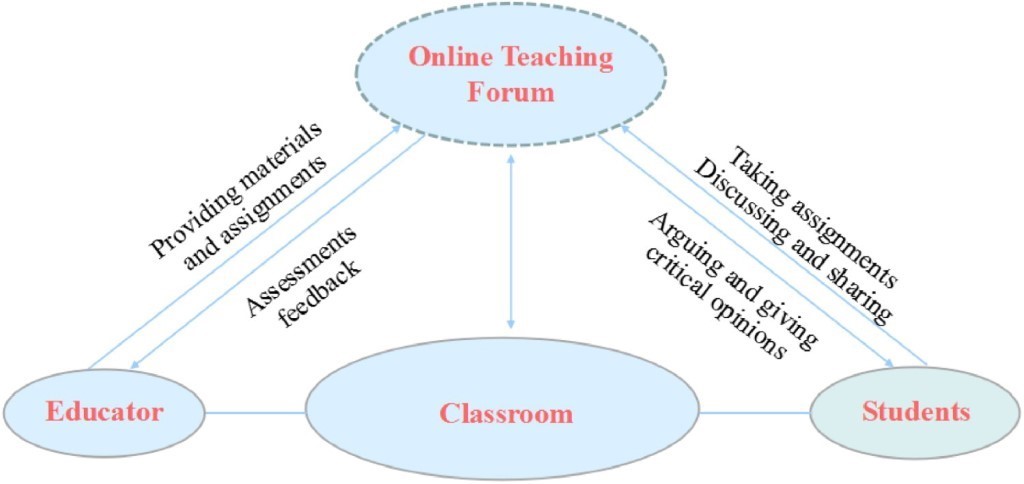
Forum-based online teaching to improve student engagement and motivation

You may also like
Improving higher education pedagogy is an ongoing challenge for educators, and online teaching poses additional barriers for engaging students.
To improve students’ learning engagement and motivation and thus minimise procrastination and plagiarism, this experiment examined a forum-based online teaching method, in which students can see what their peers are working on and share their own projects and sources for others to view online.
This method introduced competition among students in completing homework and responding to the instructor’s questions on learning management systems such as Moodle or Canvas.
How it works
Students are asked to choose a specific topic for a term paper or homework question to work on and avoid repetition or overlap with their fellow students.
Their choices are posted on the learning management system and available to be viewed by others.
Moreover, their responses and answers are also accessible to fellow students in an effort to minimise repetition and encourage unique answers based on self-learning, through reading and analysis of relevant literature.
For example, the table below is part of a student report that was jointly completed by class students in a forum-based homework assignment.
For this task, students worked on a literature summary of different air purification technologies and estimated the energy efficiencies per removal of airborne microbes.

Students were first asked to sign up and select their topic and reference papers on the forum platform. This informed others of their choices so no one else should use this topic or resource.
Then each student worked on their case studies, filling out this table with information they found during their research, such as the types of air purification processes, microbial types, and the calculated energy consumption per unit removal of airborne microbes.
- Collected advice on good online assessment practices
- Guiding students to learn from each other through peer feedback
- Tech tools that boost student engagement through competition and interaction
The benefits of this forum-based teaching model
This homework setting fosters and enriches the knowledge diversity and promotes students’ proactivity as they witness others submitting work and experience a certain amount of peer pressure to complete their own assignment.
It also reduces procrastination as students who pick the topics early will have more choice to select the ones they prefer.
Plagiarism is largely prevented because students need to present their unique answers and results based on their own choices of systems and parameters.
Grading is based on factors such as information accuracy, completeness, and quality of references. This grading policy encourages a healthy level of competition among students.
In addition to individual homework, group or teamwork could also incorporate this forum-based concept, where student teams are required to select topics they prefer and collate their unique research results that are shared with other groups via the online platform or forums.
Research conclusions
Our results showed that compared with traditional class teaching, forum-based online teaching improved students’ learning engagement and motivation, and reduced procrastination and plagiarism.
Although some students were resistant to this new forum-based online teaching, most of the students embraced the moderate levels of peer pressure and competition that were created by the forum-based learning process.
Therefore, forum-based online teaching can be considered a useful complementary approach to traditional class teaching models.
There are multifaceted implications of our experimental study:
First, higher education does not only convey knowledge but provides the landscape for enhancing critical thinking, research and problem-solving capabilities.
This new exploratory forum-based method moves teaching away from the traditional teacher-centred model towards student-centred teaching.
A student-centred environment and pedagogic discussion spaces are important for supporting and fostering active learners.
Second, higher education should engage students’ real life experiences or culture to enlighten their learning process.
Forum-based online teaching creates a virtual third space of “school life”, where students have the opportunity to blend their unique life experiences or opinions with academic homework.
Through self-exploration of real-world problems, learning interests and engagement are both increased.
Discussions about cutting-edge research and real-world problems in the classroom always complement and strengthen faculty lectures that are usually limited to covering theories or principles due to finite classroom time.
Finally, breaking a final “term paper” into multiple small projects via online teaching forums helps students complete homework assignments without procrastination or plagiarism.

Xiaowei Kang is an an associate professor at College of Teacher Education, Capital Normal University in Beijing, China.
Wen Zhang is an associate professor of New Jersey Institute of Technology’s Newark College of Engineering.
If you would like advice and insight from academics and university staff delivered direct to your inbox each week, sign up for the Campus newsletter.
Additional Links
Read the full research paper "An experimental case study on forum-based online teaching to improve student’s engagement and motivation in higher education".


